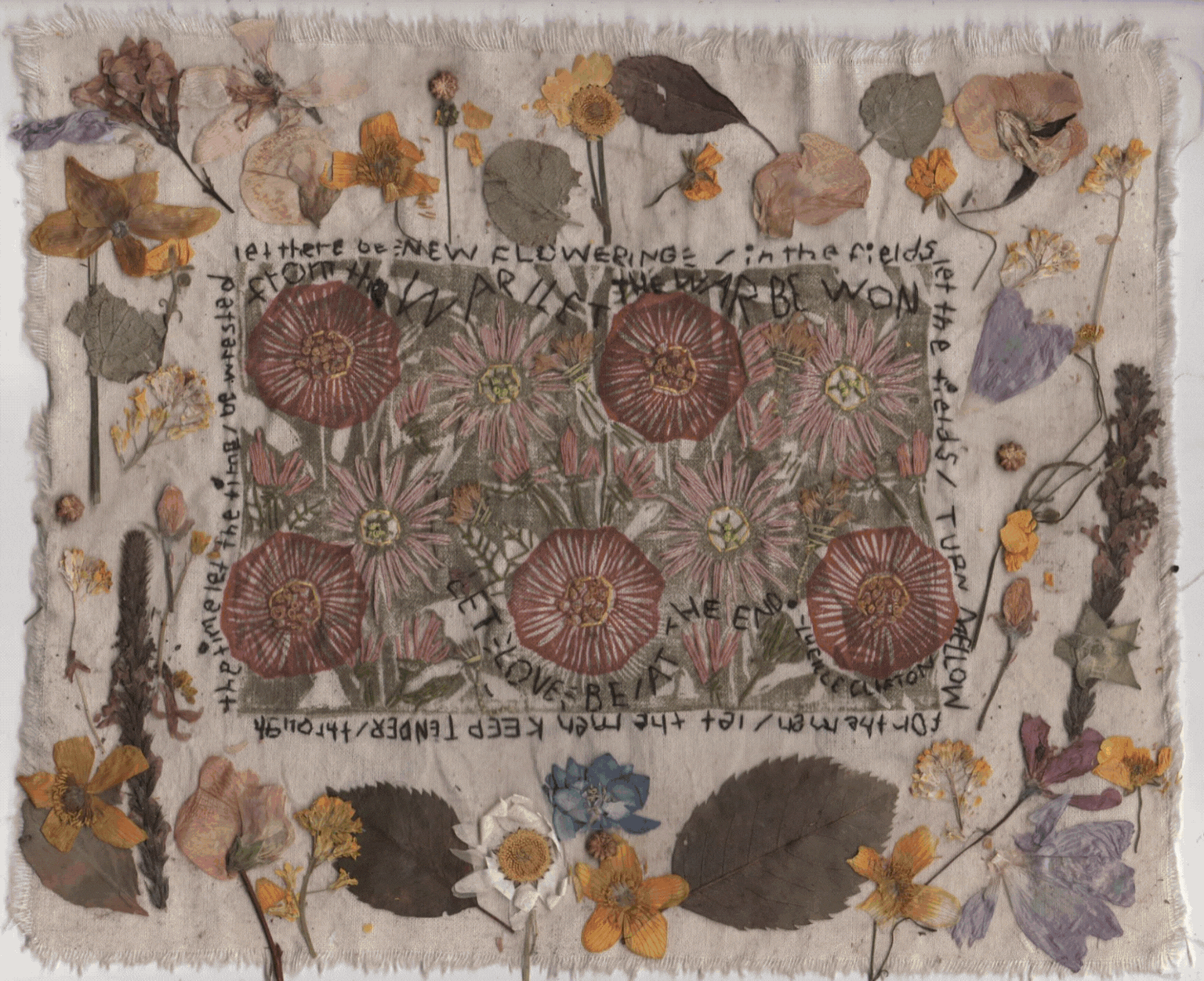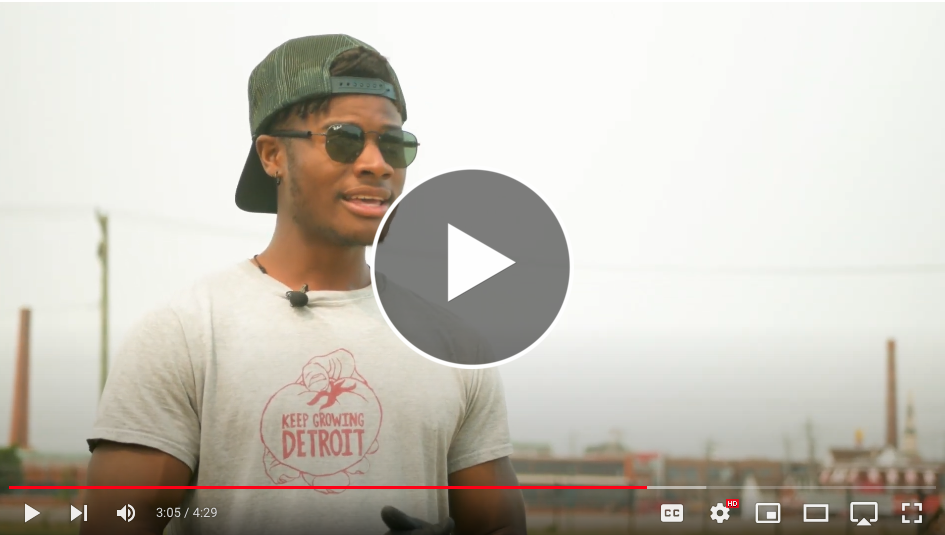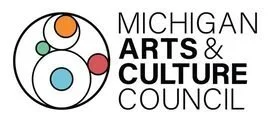The Whole Field • Volume 3 • No. 2 • Full Moon • January 25, 2024
“Let There Be New Flowering,” “Tomorrow is a Place,” “The Great Mycelial Connection,” “Ballad of the Butterflies,” and “Witness.” • Liza Polaskey of The Pick-Me-Up Press and The Lewis School • Linocut, Embroidery, and Collage • 2021-2023
In This Issue: A Video Visit to Keep Growing Detroit
Food Sovereignty in an Urban Context—Keep Growing Detroit
Liza Polaskey (the artist behind the visuals above) and Connor Brown are working to restore an 1880s schoolhouse in Kalkaska and, in the process, re-establish “it as a local hub of learning, growing, creating, and connecting.”
Before that work began in 2020, they engaged in similar pursuits in Detroit—where this newsletter’s video takes us. Here’s Liza and Connor on Keep Growing Detroit: “They were our introduction to all things farm, garden, and permaculture during our days in the city and they continue to be a huge inspiration for us in our current work up here in the woods.”
Catch some of that inspiration by watching below as Akello Karamoko, Keep Growing Detroit's farm manager, offers a tour of KGD Farm and a quick dive into the organization's mission of food sovereignty in the city.
If your interest is piqued and you want to catch his ear in person, know that he’s been making his way up north as well—here’s Akello on the Northern Michigan Small Farm Conference:
“It's always a special event for me because it's a family reunion with my farmer friends across the state of Michigan. I began going after I completed Michigan State’s Organic Farmer Training Program and many of my cohort who graduated with me met up at the conference, alongside past participants also there. It’s a great opportunity to expand who I know growing throughout Michigan.” Keep an ear out for rumblings on this year’s NMSFC. Until then, here’s Akello.
The Warp — Ideas and Inspiration
|| 1 || “Food from urban agriculture has carbon footprint six times larger than conventional produce, study shows” has been making the rounds on social media. Of those I’ve seen engaging with the piece, the takeaway to grapple with isn’t that urban farms have six times the carbon output of their conventional counterparts. Readers mull over how scientific research is interpreted, publicized, and shared. They question the datasets. And they weigh in on just what it is that prevents lasting infrastructure in small-scale, urban gardens. If you read the headline and are left with the lingering thought that perhaps urban agriculture doesn’t have an important role in future food systems, watch this short video from those behind the study itself. Or note that while certain urban ag crops and 25% of the urban agriculture sites already outperformed conventional agriculture’s counterparts, three practices “crucial to making low-tech urban agriculture more carbon-competitive with conventional agriculture” were identified:
1.) Extend infrastructure lifetimes.
2.) Use urban wastes as agriculture inputs.
3.) And generate high levels of social benefits.
“To understand urban sustainability, we have to understand things more broadly than carbon footprint… because urban sustainability relies on, of course, the climate and environmental impacts but it also relies on things like place-based benefits. It relies on how things impact the people in those communities. So sustainability has a very holistic definition when you look at it in the cities.” —Jason Hawes, Co-Lead Author of “Comparing the Carbon Footprints of Urban and Conventional Agriculture”
|| 2 || I’ve recently heard from a handful of folks with side gigs considering hiatus or shutting down. I’m experiencing some of the same pressures with my coffee roasting. Margins are getting slimmer, and the costs of labor-intensive labors of love are difficult to justify. I’ve also received clarification from a few that they aren’t entirely shutting down but are redirecting to more informal contexts. These people ask, “How do we use the skills and equipment we already have to meet the needs of others in a way that isn’t wholly subservient to the market?” The market caveat: what’s that all about? One of the dangers of tying livelihood and lifestyle to market trends and optimizing algorithm content is that all coffee shops begin to look the same while home interiors take the same path. Monotony aside—it’s not a one-and-done pattern; it’s constant revisioning, remodeling, reposting and resharing so that you or your business don’t get left behind. That treadmill is the antithesis of the three best practices for improving urban, low-tech agriculture listed above—the process of chasing the market is unnecessarily resource-intensive, doesn’t reuse things well, and isn’t responsive to what’s socially beneficial. So be it if a more holistic approach involves canning the spreadsheet and making things a bit weird.
What would a housing market that values individualization look like? How does a more robust social safety net (and less emphasis or ability to accumulate wealth) affect norms of interior design? How might a de-emphasis on resale (and the premium on “luxury” spaces) create and bolster more demand for smaller homes, for more inventive co-housing, for more affordable and accessible homes?
What do you truly love in a house — not because it’s current, not because it’s on HGTV, but because it makes it feel like you, a person in the world, live there? And how different would it feel to look upon your space not with the harsh eye of the market, but with the warm, gracious lens of home?
-Anne Helen Petersen, How Your House Makes You Miserable: The Rise of the Market-Reflected Gaze
|| 3 || Also on hiatus: Cabin-Time, a roaming creative residency to remote places. I discovered Cabin-Time through the work of an artist (and previous CT participant) I’ve been talking to. The exposure led to enjoyment as I explored the work of past cohorts in Deer Isle Archipelago, ME, Bogue Lake, MN and Wilderness State Park, MI. Unfortunately, 2017’s gathering in Lone Pine, CA was the last. In that final cohort’s photo, a familiar face floats: Micah Middaugh. I might have missed Cabin-Time, but I didn’t miss Micah/Breathe Owl Breathe’s presence in the Winter Tones series at The Alluvion. I’m sorry if you did. There’s always hope for a return.
|| 4 || From 2010 to 2017, Crosshatch ran its own artist residency—the Hill House. You can catch up on that story in parts 2 and 3 of this writing from Brad. Ideally, that residency will return as:
1.) The arts are deeply needed.
2.) Support and hospitality for artists are deeply needed.
Right now, needed space is offered through Tusen Takk in Leland, among others. If you aren’t familiar, Commongrounds’ second floor currently hosts Katrina Bello’s Tender Sun exhibition. The work, shown through a partnership between Alluvion Arts @ 414 and Tusen Takk, resulted from “inspiration in the colors and geological history of the Northern Michigan landscape, considering themes of migration, time, and place.” Bello’s work will be on display through February 25th, 2024.
The Weft — News and Events
We’re heartened by a wide-range of expressions of resilient communities and gatherings. Here’s a smattering of regional events and happenings that reflect that diversity, collected for your consideration. Choose your own adventure!
|| 1 || As this year’s Long Memory Project: Pride draws closer, Crosshatch is seeking community elders to tell their stories. If you have a story you’d like to tell, any 2SLGBTQ members ages 55+ are encouraged to apply online. Find more information here.
|| 2 || Grand Traverse Conservation District’s Winter Webinar Series: Free to Grow—A Discussion on the Future of Michigan’s Old Growth. Tuesday, February 6th, from 6-7pm. “Nick Sanchez, Network Manager at the Old-Growth Forest Network, will explore the status of old-growth in Michigan and the importance of old forests for human health, biodiversity and water quality. In addition, Nick will also discuss actions needed to protect and restore future old-growth and how to connect people to these forests.” Free, register here.
|| 3 || Combining Solar with Agriculture Series. A four class series focusing on agrivoltaics, or the combination of solar arrays and active agricultural sites. Beginning February 6th and concluding June 15th, with three online sessions and one field day. Presented by North Central Michigan College’s Lifelong Learning Club, Crosshatch Center for Art and Ecology, USDA-RMA and the Local Food Alliance of Northern Michigan. Find more information and register here.
|| 4 || The Antrim Writers Series: Write Here, Write Now.
Author Reading and Discussion with Jerry Dennis on Up North In Michigan: A Portrait of Place in Four Seasons. 7pm at Bee Well, Bellaire, MI, on February 6th.
Non-fiction Writing Workshop with Jerry Dennis, 2:30-4:30pm on February 7th, at the Forest Home Township Hall.
|| 5 || National Writers Series: Workshops and Classes for Students in Northern Michigan and beyond. Find information and register here for offerings like Poetry with David Hornibrook (5th-8th grade, Elk Rapids and online), and Literary Short Story with Karin Killian (9th-12th grade, at Commongrounds and online.) Classes are free, while space is limited.
|| 6 || Michigan Food & Farming Systems. MIFFS’ Farm Business Management for the Global Majority online course is now open for registration. This course invites Black, Indigenous, Latinx, Southeast Asian, New Immigrant/New American, and all farmers of Color to join this learning series in 2024. We are affirming and recognizing that these groups that have been historically oppressed are the global majority. Increase your expertise in keeping farm records, improve your knowledge of past and current inequities and barriers in farming, and increase your skills in decision-making and navigating these systems so that all farms and farmers can be successful. Register here.
|| 7 || MI Ag Ideas to Grow With Virtual Conference. Feb 19th-March 1st. Session tracks include Animal Agriculture, Beginning Farmer, Field Crops, Preserving MI Harvest, and Vegetables. Find more information on specific offerings and register here.
|| 8 || Registration for the 20th Annual Michigan Family Farms Conference (MFFC) is now open. Happening March 9, 2024 at KVCC in Kalamazoo, MI, the MFFC offers beginning, small-scale, and culturally diverse farmers a chance to network, learn, and build sustainable family farms. It is an energizing, hands-on event featuring multiple tracks of breakout sessions plus a youth track to engage the whole family. Learn more and register here.
|| 9 || Happenings at The Alluvion Between Now and the Next Whole Field include: Jeff Haas Trio with Laurie Sears, Anthony Stanco, Marion Hayden, Tariq Gardner and Lisa Flahive, Matthew Cochran and the Interlochen Guitar Ensemble with Kate Botello, The Bill Sears Quintet feat. Xavier Davis, Bobby Ferrazza, Rodney Whitaker and Keith Hall, Big Fun, Death Club, Mindful + Musical with Miriam Pico, Good on Paper Improv, Planet Ant “Home Team” Improv, Go Comedy Improv, and “Tilt Think” Improv.
Find more information at www.thealluvion.org.
|| 10 || MSU Extension’s Sustainability Speakers Series Spring 2024. Bicycle trailer food scrap collection, household food waste, effective recycling practices, and more. Find information on the upcoming virtual “lunch and learns” February through May here.
|| 11 || Applications are still open for the 2024 Food & Farming Microloans.
Supported by Oryana Community Co-op, Grain Train Natural Foods Market, and the Kalkaska Economic Development Corporation, these loans support new and developing food and farming businesses, helping our region’s food system become more vibrant and resilient. These zero-interest loans are available in quantities from $500 to $10,000, and can be utilized for land, livestock, equipment, distribution, marketing, certification, and so much more.
Applications are due on February 7th, and are open to farmers and food producers in Antrim, Benzie, Charlevoix, Cheboygan, Emmet, Grand Traverse, Kalkaska, Leelanau, Manistee, Missaukee, Otsego, and Wexford counties. It is free to apply. More info available here.
sponsored by:
Desmond Liggett Wealth Advisors is a mission-driven, fee-only wealth management company with a simple purpose: to generate exceptional value for the individuals, families, small business owners, and non-profit organizations they serve. Desmond Liggett Wealth Advisors believe in and adhere to triple-bottom-line analysis for portfolio investments, ensuring that they review how a company’s environmental and social values impact its long-term resilience and, consequently, value.
Many thanks to the Michigan Arts & Culture Council and the National Endowment for the Arts for their support of this work.
Crosshatch’s The Whole Field is a biweekly (meaning roughly every other week) human-written newsletter. We aim to provide engaging, thought-provoking content that’s worth your time. If you’ve been forwarded this email and want to receive future editions, click here to subscribe to our mailing list or view past newsletters.
We also envision this best as a collaborative work. If you have any suggestions, leads, questions or feedback, we appreciate your reply directly to this email.
Copyright (C) 2023 Crosshatch. All rights reserved.











